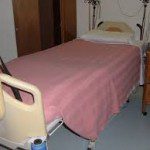 With other diseases in the news, it is easy to believe that the greatest danger in hospitals is Ebola. Although Ebola is clearly dangerous and can be fatal, it is very rare in the United States. On the other hand, one of the more prevalent hospital-borne infections is MRSA. MRSA stands for Methicillin-resistant Staphylococcus aureus. MRSA is a bacteria that is resistant to many commonly prescribed antibiotics.
With other diseases in the news, it is easy to believe that the greatest danger in hospitals is Ebola. Although Ebola is clearly dangerous and can be fatal, it is very rare in the United States. On the other hand, one of the more prevalent hospital-borne infections is MRSA. MRSA stands for Methicillin-resistant Staphylococcus aureus. MRSA is a bacteria that is resistant to many commonly prescribed antibiotics.
Typically, MRSA presents itself as an eruption on the skin. But, in hospitals, clincis and surgery centers, as well as rehabilitation centers and nursing homes, MRSA can contribute to infections in the bloodstream, infected surgical sites and even pneumonia. MRSA can even be fatal.
How is MRSA spread? In institutional and medical settings, MRSA is usually spread when somebody touches an infected wound and then has contact with an uninfected person without first washing hands and/or donning protective gloves. MRSA can also be spread in places where people are in close quarters, including dormitories and even gyms and fitness clubs.
Diagnosing MRSA: In order to definitively diagnose MRSA, the infected site has to be swabbed and then sent to the laboratory to be investigated.
What Can Each of Us Do to Protect Ourselves?
- Practice good hygiene.
- Check your hands for cuts. Keep cuts covered with bandages until they heal.
- Wash your hands often, in warm soapy water and for enough time (sing “Happy Birthday” twice each time you wash!)
- Shower and wash hands thoroughly after going to gyms or fitness centers.
- Monitor any new sores or cuts. If they are not healing properly, seek medical attention. Ask if your infected site should be tested for MRSA.
- Be particularly cautious if you know you have been in close contact with someone with MRSA.
Preventing Health Care Workers From Transmitting MRSA: If you or a loved one are a patient or resident of a care facility, you may want to monitor the staff on your own and be sure that they follow the protocol for prevention of MRSA and other pathogens. Good hygiene practices include:
- Separation of soiled laundry and quick removal from infected sources.
- Washing hands thoroughly before touching each new patient (you may ask your doctor to wash his or her hands in front of you before they examine you; it’s not rude.)
- Cleaning and disinfecting surfaces that have been utilized by multiple people: phones and TV remotes, door handles, toilet seats, etc.
- Cleaning equipment thoroughly that will be in contact with multiple patients (like stethoscopes).
- Utilizing cleaning and disinfectant products that are designed to eradicate staph infections.
- Placing patients with MRSA in single rooms, if possible. If impossible, they should only be placed with other residents who are at low risk for acquiring MRSA. Dialysis patients and chemotherapy patients with MRSA should be placed as far as possible from other patients.
